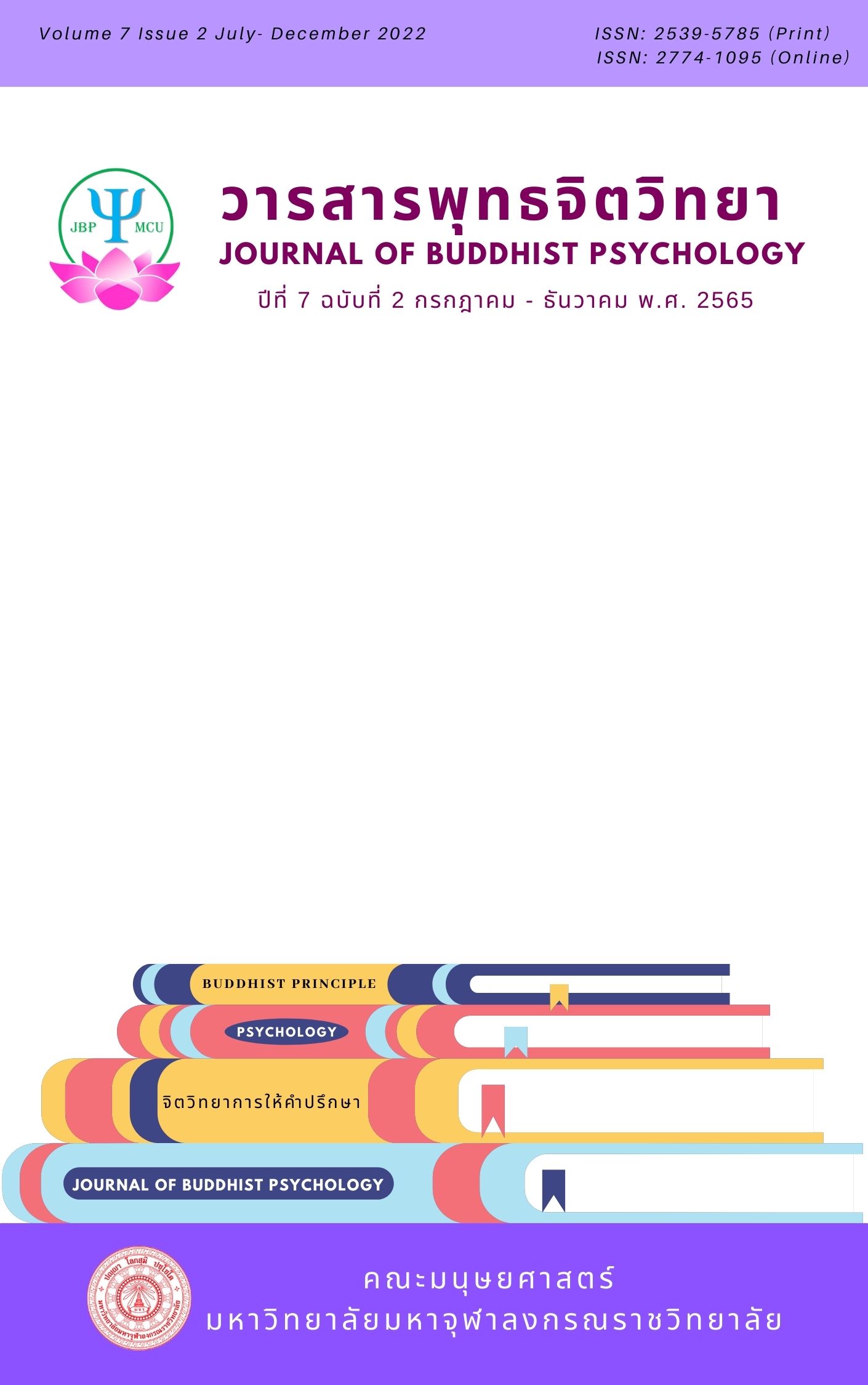การพัฒนาและตรวจสอบคุณภาพมาตรวัดการยืดหยุ่นทางความคิด สำหรับนิสิตระดับปริญญาตรีฉบับภาษาไทย
Main Article Content
บทคัดย่อ
การยืดหยุ่นทางความคิด เป็นความสามารถทางความคิดที่ช่วยให้บุคคลสร้างแนวทางที่มีความหลากหลายเมื่อต้องพบกับสถานการณ์ที่เปลี่ยนแปลงไป และมีความพร้อมที่จะรับมือกับสิ่งใหม่ๆที่จะเกิดขึ้นได้อีก บทความวิจัยนี้มีวัตถุประสงค์ เพื่อพัฒนามาตรวัดและตรวจสอบคุณภาพมาตรวัดการยืดหยุ่นทางความคิดสำหรับนิสิตระดับปริญญาตรีฉบับภาษาไทย โดยบูรณาการมาจากมาตรวัด Cognitive Flexibility Scale ของ Martin และ Rubin (1995) กับมาตรวัด Cognitive Flexibility Inventory ของ Dennis และ Vander Wal (2010) ให้มีความสอดคล้องกับบริบทในสังคมไทยโดยเก็บข้อมูลในกลุ่มตัวอย่างที่เป็นนิสิตระดับปริญญาตรี จำนวน 1,509 คน จากการสุ่มแบบซับซ้อน (Complex sampling) พบว่าผลการตรวจสอบความตรงเชิงเนื้อหาเท่ากับ .91 ผลการตรวจสอบความตรงเชิงโครงสร้าง ได้แก่ 1) การวิเคราะห์องค์ประกอบเชิงสำรวจ (EFA) ทำให้ได้มาตรวัดจำนวน 24 ข้อคำถาม มี 3 องค์ประกอบ คือ ทางเลือก การควบคุม และความสามารถในการสื่อสาร 2) การวิเคราะห์องค์ประกอบเชิงยืนยัน (CFA) พบว่าโมเดลการวัดการยืดหยุ่นทางความคิดสอดคล้องกับข้อมูลเชิงประจักษ์ (x2 =133.63, df = 160, x2/df= 0.84, p = 0.94, RMSEA = 0.00, RMR = 0.029) และผลการตรวจสอบความเที่ยงขององค์ประกอบย่อยและทั้งฉบับ มีค่าเท่ากับ .85 , .83 , .82 และ .89 ตามลำดับ มาตรวัดการยืดหยุ่นทางความคิดสำหรับนิสิตระดับปริญญาตรีฉบับภาษาไทย จำนวน 24 ข้อ มีความตรงและความเที่ยงอยู่ในเกณฑ์ดีมีความน่าเชื่อถือในการนำไปใช้กับนิสิตระดับปริญญาตรีของไทยได้
Article Details

อนุญาตภายใต้เงื่อนไข Creative Commons Attribution-NonCommercial-NoDerivatives 4.0 International License.
เอกสารอ้างอิง
โสเพ็ญ ชูนวล.(2559). การพัฒนาและตรวจสอบคุณภาพเครื่องมือวิจัยทางการพยาบาล. วารสารการปฏิบัติการพยาบาลและการผดุงครรภ์ไทย, 3(1), 64-78.
Al-Zoubi, E. M. . (2020). Quality of Life and Its Relationship with Cognitive Flexibility among Higher Education Students. Journal of Educational and Social Research, 10(4), 156.
Asıcı, E. & İkiz, F. (2015). A pathway to happiness: Cognitive flexibility. Mehmet Akif Ersoy University Educacional Faculty Journal, 1(35), 191-211.
Beck, A. T. (1967). Depression: Clinical, experimental, and theoretical aspects. New York: Harper & Row.
Bilgin, M. (2017). Relations to five factor personality model with cognitive flexibility in adolescents. Electronic Journal of Social Sciences, 16(62), 945-954.
Brislin, R. W. (1986). The wording and translation of research instruments. In W. J. Lonner, & J. W. Berry (Eds.), Field methods in cross-cultural research (pp. 137-164). Beverly Hills, CA: Sage.
Cañas, J. J., Quesada, F. J., Antoli, A., & Fajardo, I. (2003). Cognitive flexibility and adaptability to environmental changes in dynamic complex problem-solving tasks. Ergonomics, 46(5), 482-501.
Chow, S.-C., Shao, J., & Wang, H. (2003). Sample size calculations in clinical research (2nd ed.). New York: Chapman & Hall/ CRC.
Cikrıkci, O. (2018). The predictive roles of cognitive flexibility and error-oriented motivation skills on life satisfaction. International Journal of Eurasia Social Sciences, 9(31), 717-727.
Comrey, A. L., & Lee, H. B. (1992). A first course in factor analysis (2nd ed.). Hillsdale, NJ: Lawrence Erlbaum Associates.
Çuhadaroğlu, A. (2013). Predictors of Cognitive Flexibility. Cumhuriyet İnternational of Education, 2(1), 86-101.
Çutuk, Z. A. (2020). Relationship between multidimensional perfectionism and cognitive flexibility in university students. Journal of Human Sciences, 17(4), 1263-1274.
Demirtaş, A. S. (2020a). Optimism and happiness in undergraduate students: Cognitive flexibility and adjustment to university life as mediators. Anales de Psicología/Annals of Psychology, 36(2), 320-329.
Demirtaş, A. S. (2020b). Cognitive Flexibility and Mental Well-Being in Turkish Adolescents: The Mediating Role of Academic, Social and Emotional Self-Efficacy. Anales De Psicología/ Annals of Psychology, 36(1), 111-121.
Dennis, J. P., & Vander Wal, J. S. (2010). The Cognitive Flexibility Inventory: Instrument Development and Estimates of Reliability and Validity. Cognitive Therapy and Research, 34, 241-253.
Gabrys, R. L., Tabri, N., Anisman, H., & Matheson, K. (2018). Cognitive control and flexibility in the context of stress and depressive symptoms: The cognitive control and flexibility questionnaire. Frontiers in Psychology,9(2219). https://doi.org/10.3389/fpsyg.2018.02219
Gülüm I. V., Daǧ I. (2012). The Turkish adaptation, validity and reliability study of the repetitive thinking questionnaire and the cognitive flexibility inventory. Anatolian J. Psychiatry, 13, 216–223.
Hanife, E. A. (2018). The relationship between pre–service teachers’ cognitive flexibility and interpersonal problem solving skills. Eurasian Journal of Educational Research, 18(77), 105-128.
Ionescu, T. (2012). Exploring the nature of cognitive flexibility. New ideas in psychology, 30(2), 190-200.
Johnson, B. T. (2016). The relationship between cognitive flexibility, coping, and symptomatology in psychotherapy (Master's Thesis). Faculty of the Graduate School, Marquette University, Wisconsin.
Kercood, S., Lineweaver, T. T., Frank, C. C., Fromm, E. D. (2017). Cognitive Flexibility and Its Relationship to Academic Achievement and Career Choice of College Students with and without Attention Deficit Hyperactivity Disorder. Journal of Postsecondary Education and Disability, 30(4), 329-344.
Kurginyan, S. S., & Osavolyuk, E. Y. (2018). Psychometric Properties of a Russian Version of the Cognitive Flexibility Inventory (CFI-R). Frontiers in psychology, 9(845), 1-9.
Kurt, A. A., & Gündüz, B. (2020). The investigation of relationship between irrational relationship beliefs, cognitive flexibility and differentiation of self in young adults. Cukurova University Faculty of Education Journal, 49(1), 28-44.
Martin M.M., Rubin RB (1995). A new measure of cognitive flexibility. Psychological Reports 76, 623-626.
Moore, B. A. (2013). Propensity for experiencing flow: The roles of cognitive flexibility and mindfulness. The Humanistic Psychologist, 41, 319-332.
Navarro, M. C., Quiroz Molinares, N., & Mebarak, M. (2022). Psychometric Study of the Cognitive Flexibility Inventory in a Colombian Sample. International Journal of Psychological Research, 15(1), 42-54.
Oshiro, K., Nagaoka, S., & Shimizu, E. (2016). Development and validation of the Japanese version of cognitive flexibility scale. BMC research notes, 9(1), 1-8.
Palm, K. M., & Follette, V. M. (2011). The roles of cognitive flexibility and experiential avoidance in explaining psychological distress in survivors of interpersonal victimization. Journal of Psychopathology and Behavioral Assessment, 33, 79-86.
Ritter S.M., Damian, I.R., Simonton D.K., Van Baaren R., Strick, M., Derks J., Dijksterhuisa A. (2012). Diversifying experiences enhance cognitive flexibility. Journal of Experimental Social Psychology, 48(4), 961-964.
Shareh, H., Farmani, A., & Soltani, E. (2014). Investigating the Reliability and Validity of the Cognitive Flexibility Inventory (CFI-I) among Iranian University Students. Practice in Clinical Psychology, 2, 43-50.
Timarova, S., & Salaets, H. (2011). Learning styles, motivation and cognitive flexibility in interpreter training: Self-selection and aptitude. Interpreting, 13, 31-52.
Toraman, Ç., Özdemir, H. F., Kosan, A. M. A., & Orakci, S. (2020). Relationships between cognitive flexibility, perceived quality of faculty life, learning approaches, and academic achievement. International Journal of Instruction, 13(1), 85-100.
UNESCO. (30 Mar 2020). 4 Ways COVID-19 Could Change How We Educate Future Generations. Retrieved October 30, 2022, from https://www.weforum.org/agenda/2020/03/4-ways-covid-19-education-future-generations/
Wang, Y., Yang, Y., Xiao, W., Su, Q. (2016). Validity and reliability of the Chinese version of the cognitive flexibility inventory in college students. Chinese Mental Health Journal, 30, 58–62.


